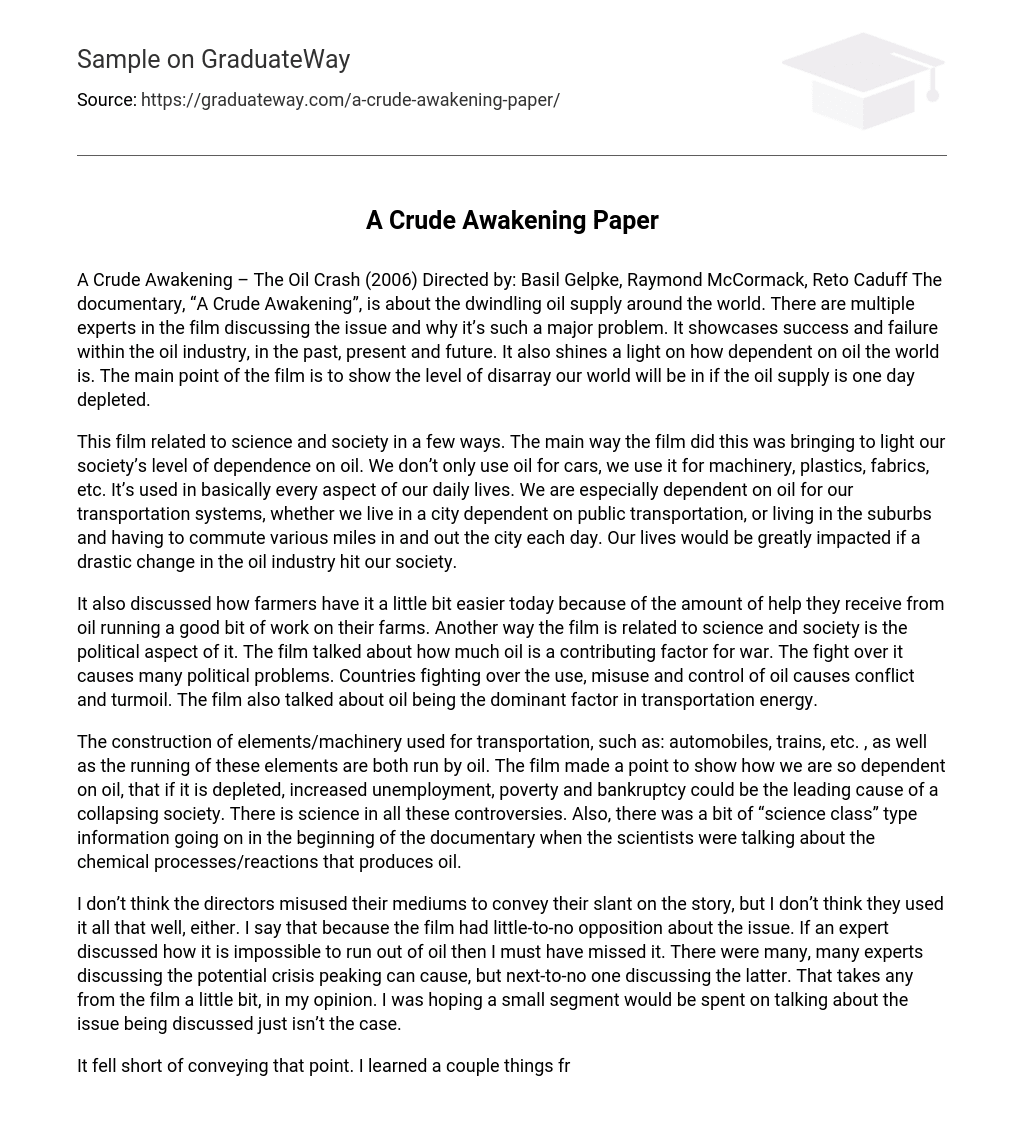A Crude Awakening – The Oil Crash (2006) Directed by: Basil Gelpke, Raymond McCormack, Reto Caduff. “A Crude Awakening” is a documentary that explores the declining global oil supply. It includes interviews with experts who analyze the severity of the issue and its potential ramifications. The film showcases both triumphs and failures within the history of the oil industry, emphasizing its importance as a global resource. Ultimately, it aims to depict the potential chaos that would occur if there was a depletion in oil supply.
The film emphasized the link between science and society, specifically by underscoring the immense reliance of our society on oil. Oil is not solely utilized for automobiles but also for machinery, plastics, fabrics, and various other purposes, thus playing a pivotal role in nearly every facet of our everyday lives. Our transportation systems, be it public transportation within urban areas or long-distance commuting in suburban regions, heavily rely on oil. Consequently, any substantial alteration in the oil industry would profoundly affect our lives.
The film explores the ways in which farmers benefit from the assistance they receive from oil, making their work on farms much easier. It also examines the political implications of oil, highlighting its role in causing conflicts and wars as countries compete for control over its use and misuse. This competition leads to numerous political problems. Furthermore, the film underscores the significance of oil as the primary source of energy for transportation.
The film emphasizes the heavy reliance on oil for the construction and operation of transportation elements like automobiles and trains. It highlights the potential consequences of depleting oil, including increased unemployment, poverty, and bankruptcy, which could lead to the collapse of society. The documentary also delves into the scientific aspect, with scientists discussing chemical processes and reactions involved in oil production.
The directors did not effectively utilize their mediums to convey their perspective on the story. While they didn’t misuse them, they also didn’t use them very well. This is because there was a lack of opposing views presented in the film. If there was an expert who discussed the impossibility of running out of oil, I must have missed it. Numerous experts discussed the potential crisis caused by peaking, but very few discussed the contrary view. This diminishes the impact of the film as I had hoped for a segment that would address the fact that the issue being discussed is not the only perspective.
It did not effectively communicate that message. I gained knowledge from this movie. I had never really considered the fact that our oil reserves are diminishing rapidly. I frequently griped about the increasing cost of gas, but I simply attributed it to the oil companies’ desire for greater profits. However, the concept that the world is nearing its peak in oil extraction is a frightening notion. It illuminated the reality that humans are depleting Earth’s resources at an exponential rate, which is quite startling.
Seeing how much of a “ghost town” Baku had become was truly enlightening, especially since just moments before in the film, we witnessed its prosperous days as a booming oil exporter. It was both surprising and alarming to observe how depleted and ominous such places can appear. Particularly noteworthy was a statement made by Colin Campbell, an Oil Geologist and Consultant to Exxon, who pointed out that oil was formed in a fleeting moment and is now being consumed over centuries. This statement instills a sense of unease given the world’s reliance on oil.
The film missed an opportunity to present opposing views on the sustainability of oil supply. Personally, I may be mistaken in thinking that we will eventually deplete our oil resources completely. This is precisely why I wished the film included a discussion on why this scenario is unlikely. As a result, my perspective on the subject was somewhat altered by the film’s persuasion. The film managed to instill some fear in me by highlighting the significance of oil. The thought of running out of oil raises concerns about our world’s future. The film even showed footage from the gas shortage in the 70s.
Although I wasn’t alive during that crisis, my parents shared with me the difficult times characterized by gas rationing, lengthy queues, and hours spent waiting for fuel. If a similar situation were to occur in our society now, it would be utterly devastating, particularly considering the heavy reliance on technology that exists today. This movie addresses a problem also tackled by the documentary “Flow: For the Love of Water” – the removal and displacement of indigenous people to allow corporations to exploit the resources on their land. It highlights the aggressive methods employed by big businesses to gain and maintain their profits.
Before watching these two films, I had never really considered this issue. It was a truly enlightening experience. I would give this film a B+ grade, deducting one letter grade for the lack of opposing viewpoints on the subject. However, I did notice the filmmakers’ significant effort and dedication in crafting this documentary, particularly by including numerous experts on the topic. The film was supported by a wealth of information, video footage, research, and propaganda, which is why it deserves a B+ rating from me. For the next semester, I highly recommend the film “The Bridge,” written by Tad Friend and directed by Eric Steel.
The film focuses on suicide incidents that occur on The Golden Gate Bridge, providing a detailed exploration of mental illness and the brain imbalances associated with suicide. The movie has sparked extensive debate, featuring various arguments, discussions, and controversies on its IMDB page. While the film does include graphic scenes of live suicides, this only enhances its shocking and thought-provoking nature. Personally, I would give it an A- grade due to its compelling narrative and potential for sparking meaningful discussions.





